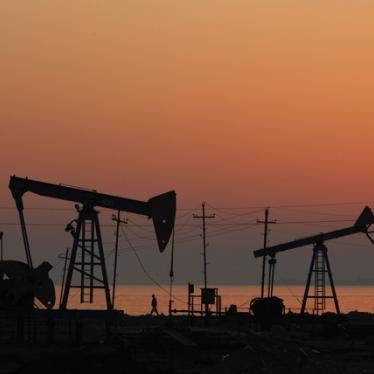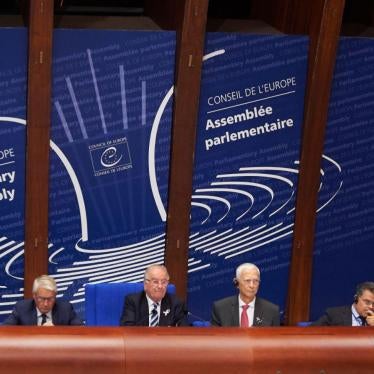Forty seven member states of the Council of Europe are to decide today whether to initiate sanctions against Azerbaijan for the first time over its persistent refusal to implement a binding European Court of Human Rights judgment. The stakes are high because Azerbaijan is threatening to leave the Council of Europe.
They are also high because the plaintiff in the case, Ilgar Mammadov, a prominent political activist, has been in prison for nearly five years on totally bogus charges, and his liberty hangs in the balance. Unless Azerbaijan upholds the court’s ruling, he risks losing another two years of his life behind bars.
In May 2014, the European Court delivered an exceptionally strongly worded judgment when it found Azerbaijan’s detention of Mammadov illegal. It said that the actual purpose of his detention “was to silence or punish [him] for criticizing the government.” The message could not be clearer, and it was backed up by at least a dozen resolutions by the Council of Europe’s Committee of Ministers demanding Mammadov’s immediate release.
But Mammadov remains in prison, at the mercy of a vindictive government. Amnesty International has recognized Mammadov as a prisoner of conscience.
By December 2015, Azerbaijan’s continued defiance triggered a rare inquiry by the Council of Europe’s secretary general, Thorbjørn Jagland. But the government’s defiance continued, and Mammadov remains in prison.
To up the stakes, last month Jagland took the unprecedented step of calling on the Committee of Ministers to trigger legal proceedings against Azerbaijan. The October 25 vote is on whether to start these proceedings. If they go forward, Mammadov’s case will get referred back to the European Court for further deliberation and ultimately could down the line result in a challenge to its membership in the Council of Europe.
Azerbaijan’s reaction was predictable. Using its mouthpiece journalists, the government started a smear campaign against Jagland, and threatened to quit the Council of Europe.
But the Committee of Ministers should not bow to these threats and pressure from Baku. The states should rather stay united in their determination to end Azerbaijan’s defiance and its mockery of justice.
The decision to start the legal proceedings is exceptional, but Mammadov’s case is not. He is one of dozens of government critics, human rights defenders, and media professionals the Azerbaijani authorities have arrested and convicted in a sweeping crackdown in the past several years. Others include Mehman Huseynov, a popular journalist who exposed high-level government corruption, and Bayram Mammadov and Giyas Ibrahimov, youth activists serving 10 years for spraying graffiti on a statue of the former president, and refusing to apologize on camera.
Azerbaijan’s government has also decimated its once vibrant civil society by adopting numerous laws and regulations restricting their operations, pushing nongovernmental groups to the margins of the law. The government has arrested leaders on bogus tax-related charges, seized their bank accounts and cut their access to independent funding.
Yet the Azerbaijani government tries to maintain the veneer of a democracy and spares no money or efforts to whitewash its poor human rights record. Investigative reporters recently exposed how Azerbaijan maintained a secret slush fund of about US$3 billion over a two-year period, among other things, to pay off European politicians to help whitewash the government’s human rights record. Several members of the Council of Europe’s own Parliamentary Assembly appear to have benefited from the funds, including one member specifically tasked with reporting on Azerbaijan.
The Council of Europe’s actions in Mammadov’s case have already caused some movement on the human rights front. Azerbaijan’s parliament started discussing reform of the use of pretrial detention and a potential decrease in the penalties for certain crimes. This is positive, but it will not resolve Ilgar Mammadov’s illegal detention. Nothing short of his immediate and unconditional release is sufficient.
It is vitally important for the representatives of the Council of Europe member states make the right decision on Wednesday and send a strong message of support to Mammadov, who has suffered enough already in his fifth year of illegal detention.









